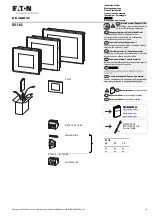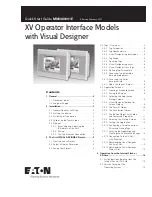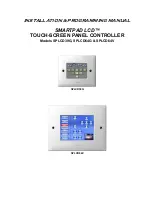
7
For more information, please refer to
Instruction
sheet
issued
by
Tyco
Electronics.
Module Terminations
A junction box as a terminal enclosure is
equipped
for
electrical
connections.
VBHNxxxSA16
and
VBHNxxxSA16B
Modules are equipped with MC
TM
plugs
as a terminal enclosure. Use these MC
TM
plugs for electrical connections
(see
Figure 4.1).
Connectors between modules must be
inserted until they click.
Junction Box and Terminals
Modules are equipped with one junction
box
containing
terminals
for
both,
positive and negative polarity, and bypass
diodes.
Each terminal is dedicated to one polarity
with the polarity symbols engraved onto
the body of the junction box (see Figure
4.2).
Each terminal is provided with factory
installed lead cables and a latching
connector
for
series
and
string
connections. Always use these connectors
and do not detach them from cables.
Latching connectors are type IV and made
by Multi-Contact. Supplied connectors
listed by UL.
In order to comply with NEC 2008, a
locking sleeve needs to be used with all
connectors that are exposed.
The locking sleeve (PV-SSH4) is made by
Multi-Contact and can only be released
with a special tool also made by Multi-
contact (PV-MS). Locking sleeves are not
supplied with modules and must be
purchased separately.
Conduit
In applications where wire raceways or
conduit are used, follow the applicable
codes for outdoor installations..
Verify that all fittings are properly
installed to protect wires against damage
and prevent moisture intrusion.
DIODES
Bypass Diodes
When modules in series strings are
partially shaded, it may cause reverse
voltage across cells or modules, because
the current from other cells in the same
series is forced to flow through the
shaded area. This may cause undesirable
heating to occur.
The use of a diode to bypass the shaded
area can minimize both heating and array
current reduction.
Modules are equipped with factory
installed bypass diodes. The factory-
installed diodes provide proper circuit
protection for the systems within the
specified system voltage, so that you do
not need any other additional bypass
diodes.
MAINTENANCE
Some maintenance is recommended to
maintain optimal output performance of
the solar modules.
It is also recommended to inspect the
electrical and mechanical connections
annually.
If you need electrical or mechanical
inspection
or
maintenance,
it
is
recommended
to
have
a
licensed
authorized professional carry out the
inspection or
maintenance to avoid the hazards of
electric shock or injury.
The return of any modules will not be
accepted
by
Panasonic
unless
prior
written authorization has been given by
Panasonic.
As part of our policy of continuous
improvement Panasonic reserves the right
to change product specifications at any
time without prior notice.
Disclaimer of Liability
Panasonic does not assume responsibility
and expressly disclaims liability for loss,
damage, or expense arising out of, or in
any way connected with installation,
operation, use, or maintenance by using
this manual.
Panasonic assumes no responsibility for
any infringement of patents or other
rights of third parties, which may result
from use of modules.
No license is granted by implication or
under any patent or patent rights. The
information in this manual is believed to
be reliable, but does not constitute an
expressed and/or implied warranty.
The return of any modules will not be
accepted
by
Panasonic
unless
prior
written authorization has been given by
Panasonic.
As
part
of
Panasonic’s
policy
of
continuous
improvement,
Panasonic
reserves the right to change product
specifications at any time without prior
notice.
Contact Information
Panasonic Eco Solutions of North America
Two Riverfront Plaza. 5th Floor, Newark, NJ
07102
business.panasonic.com/solarpanels
Figure 4.2 Junction Box
Cable
Positive ( + )
Negative ( - )
Figure 4.1 Connectors
Option:
Safety
lock
clip
Connector
MC
TM
Plug
Cable
Negative ( - )
Positive ( + )





























